#Medical Discoveries
Explore tagged Tumblr posts
Text
Cancer Research: Scientists Triumph in Taming the Protein of Severe Cancer Cases 24
In the realm of medical breakthroughs, scientists have achieved a remarkable feat in the battle against severe cancer cases. The focus of their triumph? Taming the elusive protein that plays a pivotal role in these challenging scenarios. Join us on this journey as we unravel the science, the victories, and the hope that comes with this groundbreaking achievement. Protein Unveiled: A Culprit in…
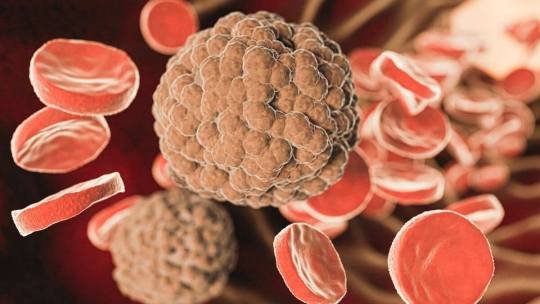
View On WordPress
#Cancer Breakthrough#Cancer research#Hope in Treatment#Medical advancements#Medical Discoveries#Personalized Therapies#Precision Medicine#Protein Taming#Scientific Triumph#Severe Cancer Cases
0 notes
Text
I’ll be a doctor one day and all the pharmaceutical reps will be waiting in the lobby for hours begging for a chance to speak with me to push their samples to patients and I’ll have pharmaceutical companies buying free lunch for my employees every day just so they can sit w me at lunch and speak to me and I’ll also have a housewife/husband but instead it’ll be an office wife/husband and they’ll run the managerial aspects of my hospital for me . Among other things
#And that’s a VOW#Also depending on how involved I’ll be in the biotech industry maybe I’ll also be a medical director and spearhead sick research projects#I’ll def be research leaning I really do love it#But I don’t wanna do that shit on the sidelines like when I’m older I want to be directing that shit#I for sure wanna be involved in drug discovery I think it’s so fun#So many goals 😞😞#Also I’ll have a high turnover for patients and patients won’t wait forever but my staff will still be pleasant and not pushy#I also hate the red tape around healthcare services so they’ll fs be a lot more accessible#I have a lot of goals that are patient oriented I was just trying to sound conceited but it goes beyond that tbh#It’s rly funny watching pharma reps grovel but there’s more to life than being groveled for
74 notes
·
View notes
Text
I’m not from thailand but there is a very similar capitalist ruling class vibe in my country that I’m picking up in these Thai BL shows and I’m tangentially but closely related to this class and all I can say is…Ming is really not that bad.
These rich boy with hearts of gold/ rich boy finds heart of gold through interaction with poor boyfriend dramas I think has skewed the way that we view rich people. As in we think of them as people that operate on a general set of values and principles that we all hold. But the casual way that Ming imprisons Joe and thinks nothing of how he’s ruining the biggest opportunity Joe’s had in his career just because he can buy him a better, more lavish life is almost painfully realistic. And no it does not at all contradict with the fact that he loves Joe. And I think the way Up plays Ming with this careful mix of being totally self unaware, even innocent at times but with absolute entitlement in every thing he does, even at his most kindest is just so chillingly revealing of the ruling class psyche.
So many people are horrified by what Ming is doing and while I’m not saying that they aren’t horrific (they are) - it’s just that if you actually know a Ming you’d know that playing with poor people’s lives is like a Tuesday morning activity for him.
#my stand in the series#my stand in#the times that my PhD has been pitched as the perfect credentials for a trophy wife is….#like I’m a brilliant scientific mind with real life contributions to medical discoveries#and still all it boils down to is how it’ll look on their shelves#rich people psyche is so fucked lmao and I’m just not sure if people know that
117 notes
·
View notes
Text

Identity Discovery Surge Disorder (IDSD)
A MUD where when one discovers a new identity of theirs, they sometimes exprience what's called a discovery surge. Discovery surges may also be triggered via uncovering new information about already discovered identities (e.g discovering new kin mems, discovering how they want to transtion, discovering what caused their identity, etc.).
The symptoms of discovery surges are:
Extreme and constant dysphoria
Heightened euphoria when affirming ones identity
Constantly obessing over the identity
Needing to talk about the identity a lot
Planning out a transtion or sometimes making implusive transtion decisions
Urge to present as the identity at all times
Doing obsessive research on the identity and things related to it
Being unable to stop thinking about the identity for long streches
Depressive episodes caused by severe dysphoria
In the case of alterhuman identities, very strong intense and hard to control shifts
Discovery surges can last days to months at time (a few months is my usual). Multiple discovery surges at once can happen, tho often one will "overpower" the others. After a discovery surge is over, a person will still hold that identity, just simply stop showing these symptoms in relation to it
Despite how bad discovery surges sometimes feel, the indvidual feels intensely empty when not expriencing one so may purposefully search for new identities in order to exprience surges.
24 notes
·
View notes
Text
I’m losing my mind… sooo a little bit ago I was combing through the Revival Book video for my fic and I noticed something interesting — The map

What about the map? Look closely…
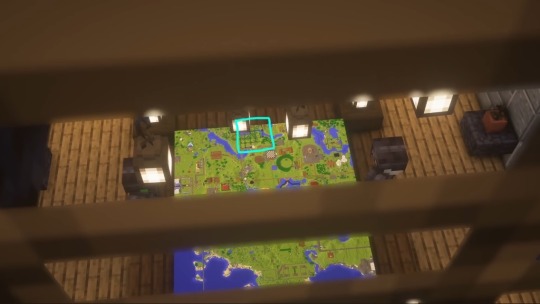

You’ll notice that marked by turquoise is none on than the - vine covered Doomsday’s grid over the water filled L’manhole! Confirming that this conversation and therefore the experiments on Vik and Lazar took place after prison.
Which means quite a few earth shattering things. Firstly, the revival book likely was not the main factor that drove him mad to the point of putting himself in the prison like we might have suspected. This also means that just in general, Dream is not as prepared, planned, well thought out and as mastermind as we thought, and a lot of things were actually more genuine after all.
Because if he didn’t know that the revival book worked (which is implied by the dialogue in this video over the map) then he really must have trusted the server and Tommy to not kill him permanently and the revival book mention was more likely a really desperate afterthought last card that he hadn’t even used yet (honestly he hardly had the time to be fair - but thankfully he memorized it I guess), which oh just really makes the server almost letting him die permanently sting so much more. Plus, this also suggests that maybe Punz did not have the revive book before prison (the dialogue in this scene certainly suggests as much), and it means Dream really was adamantly afraid of dying in prison, making his stubbornness to not give up the book and endure the torture make a lot more sense. Further highlighting that he also was likely not as prepared or thick skinned going into the prison as we might have thought. It also implies that he is likely being truthful about Tommy being his first revival. Oh and there’s also the fact that in this conversation he suggests killing Philza after Philza helped rescue him, which just… rude (but that doesn’t really make sense anyways since I doubt he would want to piss off Techno but still)… and since we now know the experiments with Vik and Lazar happened after prison I’d say that if staged duo did experiments on eachother it would also be after prison because why would you test on yourself before knowing that it can bring you back from any death, that’s pretty risky, (which also aligns with Dream having his original 3 lives in the staged finale).
Oh and if that wasn’t crazy enough, I also noticed there are end rods in the laboratory!
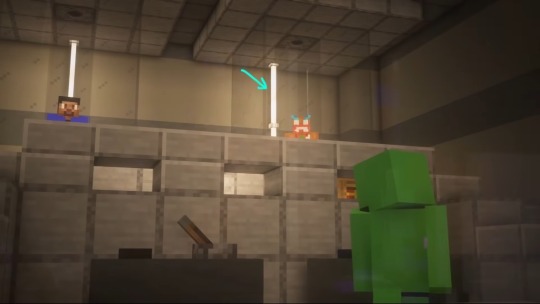
Heeeeehhhhh?!!!….. Which means they went to The End (and I already kinda suspected that since they talked about it in the finale, but I certainly didn’t think they went before/(during?) the basic experiments on Vikk and Lazar.) And not only did they go to the End they went to an End City, which does that mean they have like elytras?…
Have I blow your mind yet? Because I’m losing my shit…
{This is all of course unless we are to take these as accidental inconsistencies and flaws in the video from a lack of due diligence (since I’m pretty sure the ccs hired someone to make it) and ignore it or retcon it, (which wouldn’t be the most unreasonable thing since the dialogue in that scene suggests that they don’t know it works at all - “but what if it does work?” which doesn’t make sense for them to say after he already brought back Wilbur and Tommy). Or alternatively, we could also go the route of disregarding things due to my other theory about the video [post] and say that since it’s from DreamXD’s pov it’s messed up because he misremembered the lore as he’s a god and wasn’t paying that much attention to detail…}
#I just… this discovery as broken me… like so many things dont make sense now.. and Dream just looks so naive and trusting it hurts…#how is it that I got an answer and it leaves me with more questions than I had before… like what about ranboo?…. it doesn’t make sense….#dsmp#c!dream#dreblr#dream smp#dsmpblr#dishing up lore#no one does it like c!dream#c!staged duo#did someone order an essay?#c!stagedduo#c!drunz#this is fine#dsmp lore#damn it really does just make it all the more heart wrenching doesn’t?… also mean Dream didn’t do he arguably worst crimes until after#prison drive him insane so points for him I guess…#lore thoughts#c!punz#HELLLPPP send a medic!!!!! I’m losing it…. anfbjambdjanbfjns
38 notes
·
View notes
Text
The Resistance squatted in abandoned buildings. They were squatters.
Before I show the panels that show they used abandoned buildings, I just want to be logical about this for a moment.
It doesn't make much sense to assume these guys - looking around jump-into-university age (18-26) - could afford to make underground bunkers and metal-plated halls all across Japan, for their base. They wouldn't have the time, resources, or even support from others to make these places.
Where do they find the metal to hammer in? The posts? The knowledge of actually building tunnels or buildings from scratch without them falling apart?
Other than that, having a single stationary base (above-ground, for example), is not going to survive. All For One's supporters fight anyone who opposes him without him needing to say anything.

AFO rules Japan right now. Everyone is wary of each other. Look at how Bruce describes it as "the harshest era";

As All For One's supporters attack his opposers of their own will, and supporters don't even realize they're on his side, the Resistance has to constantly be on the move. They can't really trust anyone.
They can't have stationary bases, nor can they afford ANYTHING to make them. They would've been caught immediately trying to do a big project like that, especially if they needed supplies to do so from someone who likely works for AFO, even without knowing.
Japan was in economic and social turmoil. They can't trust the market to keep going and grocery stores to be open. Look at how Japan is with All For One and Tomura; people band together and stores are looted.
Money is obsolete. Society is divided between humans and "monsters" (Ability-users). You can't trust anyone because anyone could be his pawn. Time is running up as his control spreads everyday. Resources are being looted left and right. It's too dangerous to go outside alone. Even if you have a stun gun, what does that mean against Ability-users?
So what do they do with their limited resources? Trying to hide from the big guy? What "bases" do they have?
They hunker down in abandoned places that already exist and, again, are abandoned. No one's going to come looking for them in places that people have run from and left behind. Because these places are literally just that: places no one wants anymore.
You hide a tree in a forest. You don't make a big, special base somewhere that says "I am here!", and they don't have the resources or time to burrow underground or build that.
Hide in an abandoned building among many others. There's not many people in abandoned places, if they happen to be there at all. The Resistance isn't going to be found in the deserted buildings, but they still have to keep moving, because someone might be trailing them.
When they take Yoichi from the vault,
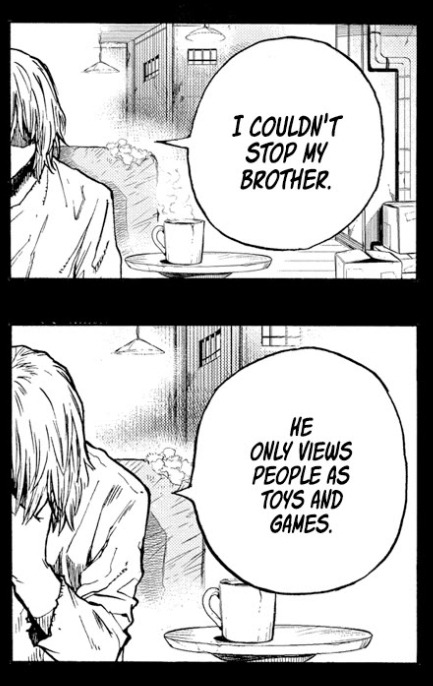
They're in a house. The couch is ripped, the mug is cracked, and so is the wall, with a questionable stain in the background. There are signs of fighting and abandonment, but it works.
Houses have food. Houses have clothes. Houses have beds. It's enough to sit in for a bit and heat up some water.
Not everyone packed their things and run. Some people just had to RUN. And when some places are full-on abandoned from an exodus, the Resistance is definitely gonna find some stuff there in the new "safe area".
Look below at where Kudo and Bruce hole up after Yoichi's death. No one's outside, there's a destroyed car, and there's some smoke further up the road.
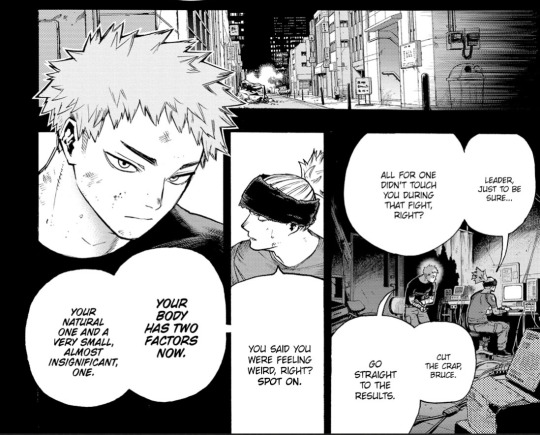
The hospital/clinic room Bruce uses is ripped apart and unsanitary, but it's still the best they can do. I think that houses and a hospital would be their best bet for survival/using as a base; resources, lodging, and some sort of safety exist there. Especially in a hospital, which would have backup generators, a camera system, and even a PA system. Hospitals have to accommodate for lots of people (food, space, lodging), and have a lot of medical equipment they can use.
Basically what I'm saying is: the Resistance likely doesn't have a permanent base. They don't have the resources or enough safety to make their own. They squat in abandoned places and move constantly, because nowhere is safe, but they can't just waltz in public and declare where they are; they have to hide in plain sight while they bide their time. In the meantime, the places they use would have to be resourceful, or they're using what they have on their backs. The manga already shows them using a house and a hospital room.
#cuz im seeing people talk about how the Resistance definitely made big fortified bases above ground and underground#and had strongholds everywhere or in one place but#where do they get the budget and time to make them?#we clearly see them hunkering down in an abandoned hospital and yoichi in some guys house#when yoichi is talking about his brother and AFOs own memory plays at the same time so theyre side-by-side#yoichi looks like he got a bit of a trim methinks#anywhoo I think bruce has a medical education or something along those lines because he knows how to run a hospital computer#and blood tests enough to detect factors. thatd have to be something recently discovered or his own discovery#since abilities just started then#bnha#boku no hero academia#my hero academia#spoilers#bruce#kudo#yoichi shigaraki#the resistance#afo#ofa#all for one#one for all#one for all users#dude not to offend but bruce and kudo dont look older than 30. they look like theyre 27 at best#bruce looks older than kudo which is why my guess is 27 being the oldest but really#id put kudo at 24 at the oldest. they look young and wouldnt have the resources to make buildings#nevermind the education or money or anything#anyway thats just my age guess of them#i think theyre about - if not /the/ - the same age#people talking about their base makes me pause because i just think: what base?#edit: THE RESISTANCE IS NOT THEIR NAME. THEY HAVE NO NAME?
111 notes
·
View notes
Text

Neturbiz Enterprises - AI Innov7ions
Our mission is to provide details about AI-powered platforms across different technologies, each of which offer unique set of features. The AI industry encompasses a broad range of technologies designed to simulate human intelligence. These include machine learning, natural language processing, robotics, computer vision, and more. Companies and research institutions are continuously advancing AI capabilities, from creating sophisticated algorithms to developing powerful hardware. The AI industry, characterized by the development and deployment of artificial intelligence technologies, has a profound impact on our daily lives, reshaping various aspects of how we live, work, and interact.
#ai technology#Technology Revolution#Machine Learning#Content Generation#Complex Algorithms#Neural Networks#Human Creativity#Original Content#Healthcare#Finance#Entertainment#Medical Image Analysis#Drug Discovery#Ethical Concerns#Data Privacy#Artificial Intelligence#GANs#AudioGeneration#Creativity#Problem Solving#ai#autonomous#deepbrain#fliki#krater#podcast#stealthgpt#riverside#restream#murf
16 notes
·
View notes
Note
hello i do not know what scully x files looks like can i see your crustiest jpegs
YES YAYAYAYYAAYAYYYY MY GIRL SCULLYYYYY








😁 i am rather fond of her <3333333333333333333
#she's so cute hehe <3 AND !! she's a medical doctor & is like. actually smart & good at this stuff not just Being There#& lwokey when freaky stuff starts happeneing she's like YIPPEE NEW DISCOVERIES ON SCIENCE !!#unfortunat;ey x files is about the fbi she's practically a cop bt i can forgive them just this once lol#thanks for the ask!!#jordan tag :D#the x files#scullyposting#scullyyyyyyyyyyyyyyyyyyyyyyyyy i love her women are so beautiful#hehe 😁#asks that send me scrolling pintrest for ten minutes
7 notes
·
View notes
Text
*writes the same exact headcannons in slightly different scenarios over and over again*
#it all comes back to my unicron-spawn Starscream and my quintesson-built Jazz#today I worked a little on us Starscream and qb Jazz becoming friends and getting a absurdly similar dynamic to how I write Prowl and Jazz#but I stopped that to work on a memory loss fic w that Jazz fighting his way from autobots to Starscream bc he was the only one who he#trusted with a complete memory back up as another not-cybertronian#and I stopped THAT to work on a qb Jazz/Prowl fic where it's non-essential no pain killer surgery that Prowl has to do on Hazx bc he refuses#to go to medics. partially bc the surgery is completely unsafe in any firm and partly bc qb Jazz doesn't want anyone else to know what he is#(and Prowl barely knows either)#but I only got a few sentences into that b4 I went to do an Autobot!DJD (AJD?) torture scene w qb Jazz where the nameless character to die#manages to tear open his chest while fighting back and finds nothing inside#BUT that's rlly similar 2 a fic where I've done the same thing w Starscream (the chest discovery in a scuffle bit) so I reread that before#I got distracted thinking abt my Starop fic that's all Starscream doesn't have a spark because he's a ghost Optimus Prime doesn't have a#spark because he's a lab experiment gone rogue. Misunderstandings ensue. which I adore but have no idea how to fit a plot into#so bc I couldn't think of anything more than a few sentences for that I went to my fic where ALL of the command trine formed from Unicron#but Skywarp and Thundercracker died early and Starscream spends millions of years searching all of cybertron and hoping Vector Sigma#reincarnation works for unicronians too. biiiig depression angst fic. I can't decide if I want it to end in Starscream self-inducing stasis#in one of Vector Sigma's chambers or whether I want it to end w Starscream brutally murdering the new trine member the reincarnated versions#of Skywarp and Thundercracker were made with (who ftr would be Sun Storm)#n that fic reminded me of that one rewritting of the Starscream's Ghost ep where Starscream catches a glimpse of Scourge and immediately#attacks. it's barely a fight because in seconds SS is ripping through layers of armor desperately searching for Thundercracker beneath the#shell Unicron gave him. He needs Thundercracker to be there (he isn't). Only when his claws have gone completely thru Scourge's back does he#round on the armada- only to completely ignore Cyclonus and go for one of his clones (Skywarp)#and that reminded me of- *gunshots*#do u see why I only ever manage to post ponies?? I have less ideas w them so I actually finish.#I'm worried of hitting tag limit but I have plenty more of even less fleshed out fics for us Starscream and qb Jazz#(I barely said half of what's in my writing docs)
42 notes
·
View notes
Text
inspired by that one post saying (paraphrasing) changing claudia’s actress makes sense from a watsonian perspective because in season two it’s no longer just louis telling the story. and that other post saying (still paraphrasing) that bailey!claudia looks more like a mix between louis and lestat.
louis gaslit himself into thinking that claudia was his and lestat’s biokid.
and then when claudia shifted to take grace’s role in louis’ life her appearance changed to more resemble a de pointe du lac.
#i mean blood types were a pretty recent medical discovery by the time claudia is turned#is it really that crazy for louis to convince himself that vampire dick is so good it can get men pregnant#armand would defo preserve louis’ self inflicted gaslighting#louis de pointe du lac#claudia de lioncourt#claudia#claudia de pointe du lac#claudia eparvier#the vampire claudia#amc interview with the vampire#interview with the vampire#amc iwtv#iwtv#sunshine’s rambles
8 notes
·
View notes
Text
Prompt #2,072
System A always assumed that they were egotypical – after all, none of the diagnostic texts about personality disorders or the like described them. But after stumbling across people with personality disorders talking about their everyday life and symptoms, System A realizes that those texts might have given them a very skewed picture of what it meant to have a disordered personality.
#plural system#pluralgang#plurality#pluralprompt#prompt blog#prompt#personality disorder#medical#ableism#self discovery
11 notes
·
View notes
Text
before starting my transition and while is was in my ex-relationship i was really into the thought of the "other half" and another person completing me. i was devastated when the divorce came (because my baseline was just being unhappy with myself) but now that i know who i am and i'm living true to my wants and needs.... i feel like a full human being who would be happy if someone shared this with me but i am no longer looking for someone to "complete" me. i am a full human!
#i've never felt this good about myself and this is even before medical transition#insane what self-discovery and acceptance can do#gender stuff#baby talk#trans journey#idk feels really good
12 notes
·
View notes
Text
HEY GUESS WHAT despite it all i am 2 weeks no migraine which i think is a record amount of time without a migraine this year >:3
#shoutout to actual medical care we <3 getting conditions treated and improving quality of life <3#can't believe i was living with almost daily migraine for ??? amount of time. it was so insidious because my main symptom is#'makes me stupid' that isn't a joke i'm like. experiencing significant neurological issues. and uhh that made it hard to tell what was#going on! such as 'wow i have a migraine almost all the time huh!' <- a discovery i made when i finally decided it was not good to#have a headache most days even if it was a vague one and then got treated for migraine and could actually kind of think again
8 notes
·
View notes
Text

MEDICAL SCIENCES!
Will one day discover
The DNA "fear factor" gene!
In the wrong hands this Science
could be quite disturbing! ... William
4 notes
·
View notes
Text
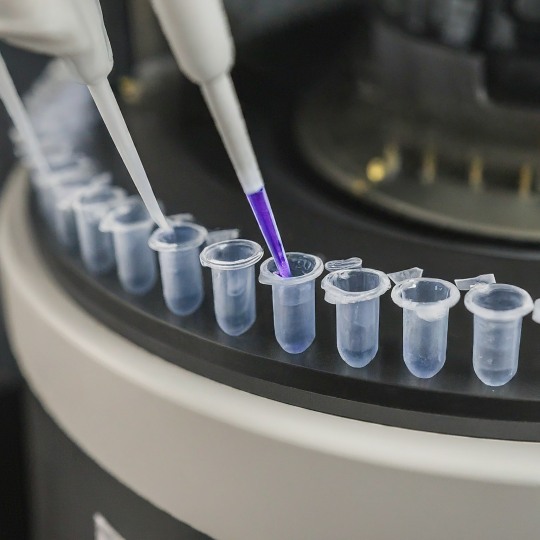
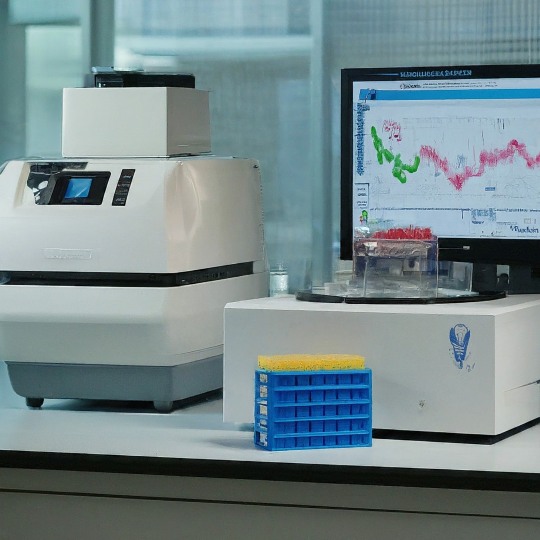
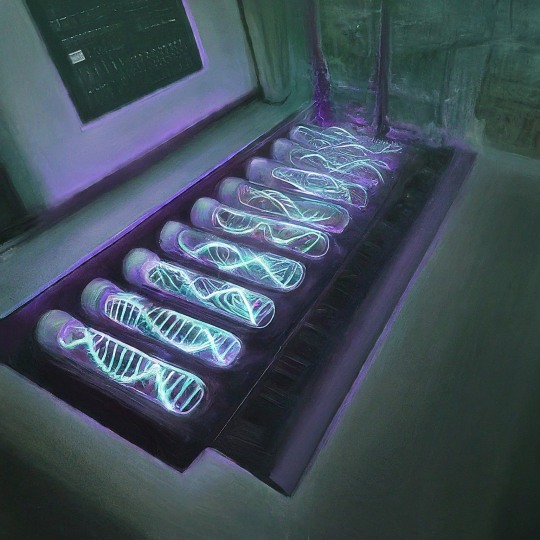
Amplifying Revolution: The Polymerase Chain Reaction (PCR)
Imagine a scenario where you have a crucial document, but there's only one fragile copy. You need numerous duplicates to analyze and share. This is exactly the challenge faced by scientists dealing with DNA. Thankfully, a revolutionary technique called Polymerase Chain Reaction (PCR) comes to the rescue. PCR, often referred to as molecular photocopying, is a fundamental tool in molecular biology. It allows scientists to exponentially amplify a specific DNA segment, creating millions of copies from a minuscule sample. This has revolutionized various fields, from diagnosing diseases to unraveling genetic mysteries.
The credit for inventing PCR is widely attributed to Kary Mullis, a biochemist working at Cetus Corporation in the early 1980s. Inspired by his nighttime drives through California, Mullis envisioned a method for exponentially copying DNA segments through repeated cycles of heating, annealing (primer attachment), and extension (polymerase-mediated DNA synthesis). This elegant concept became the foundation of PCR. Mullis's concept was brilliant, but a crucial hurdle remained. The process required a DNA polymerase enzyme that could withstand repeated heating and cooling cycles. The solution came from an unexpected source: hot springs. In 1976, researchers discovered Taq polymerase, a heat-stable enzyme isolated from the thermophilic bacterium Thermus aquaticus. This discovery was a game-changer, as Taq polymerase could function optimally during the high-temperature steps of PCR. In recognition of its transformative impact on science, Kary Mullis was awarded the Nobel Prize in Chemistry in 1993, alongside Michael Smith, who pioneered site-directed mutagenesis.
While the core concept of PCR was established, the technique required further refinement. Pioneering researchers like Henry Erlich at Cetus played a vital role in optimizing reaction conditions, automating the process, and developing the now-ubiquitous thermal cyclers that precisely control the temperature changes needed for PCR. The 1980s and 1990s witnessed a surge in PCR applications. In 1985, PCR was used for the first time to analyze sickle cell anemia, demonstrating its potential for clinical diagnostics. Forensic science embraced PCR in 1987, with the successful amplification of DNA from a single human hair. By 1989, highly sensitive DNA fingerprinting techniques based on PCR became a game-changer in criminal investigations.
At the heart of PCR lies a clever exploitation of the natural process of DNA replication. The key players in this drama are:
Template DNA: The DNA sequence that contains the target region to be amplified
Primers: Short sequences of nucleotides that flank the target DNA region and serve as starting points for DNA synthesis.
DNA Polymerase: Enzyme responsible for synthesizing new DNA strands by extending the primers using nucleotides.
Nucleotides: The building blocks of DNA, including adenine (A), thymine (T), cytosine (C), and guanine (G).
Buffer Solution: Provides optimal conditions for the enzymatic reactions to occur.
Thermal Cycler: Instrumentation used to automate the PCR process by cycling through different temperatures.
At its core, PCR mimics the natural process of DNA replication within an organism. However, PCR condenses this complex process into a series of controlled steps carried out within a test tube. Here's a breakdown of the PCR cycle:
Denaturation: The first step involves heating the reaction mixture to a high temperature (usually around 95°C), causing the double-stranded DNA to separate into two single strands. This process is known as denaturation.
Annealing: The temperature is then lowered to allow the primers to bind (anneal) to their complementary sequences on the single-stranded DNA. This typically occurs around 50-65°C, depending on the primer sequences.
Extension: With the primers bound, the temperature is raised again, and DNA polymerase synthesizes new DNA strands by extending from the primers using the nucleotides present in the reaction mixture. This step occurs at a temperature optimal for the DNA polymerase enzyme, typically around 72°C.
Cycle Repetition: These three steps—denaturation, annealing, and extension—are repeated multiple times (usually 20-40 cycles), resulting in an exponential increase in the number of DNA copies. Each cycle doubles the amount of DNA, leading to millions of copies of the target sequence after just a few cycles.
The beauty of PCR lies in its repetitive nature. With each cycle, the number of copies of the target DNA segment doubles. After 30 cycles, for example, you can have billions of copies of the specific DNA region, enough for further analysis.
This versatile technique has spawned numerous variations, each tailored for a specific purpose. Let's delve into some of the most common types of PCR:
Real-Time PCR (qPCR): Real-Time PCR, or quantitative PCR (qPCR), revolutionized nucleic acid quantification by enabling the real-time monitoring of DNA amplification. This technique utilizes fluorescent reporter molecules to measure the accumulation of PCR products during each cycle. qPCR is invaluable in gene expression analysis, microbial quantification, and diagnostic assays due to its high sensitivity and quantitative capabilities.
Reverse Transcription PCR (RT-PCR): Reverse Transcription PCR combines PCR with reverse transcription to amplify RNA sequences. This technique converts RNA into complementary DNA (cDNA) using reverse transcriptase enzyme before proceeding with PCR amplification. RT-PCR is pivotal in gene expression studies, viral load quantification, and the detection of RNA viruses such as HIV and SARS-CoV-2.
Nested PCR: Nested PCR involves two rounds of amplification, with the second round using a set of nested primers that bind within the product of the first round. This nested approach increases specificity and reduces nonspecific amplification, making it ideal for detecting low-abundance targets and minimizing contamination. Nested PCR is commonly used in forensic analysis, pathogen detection, and rare allele identification.
Multiplex PCR: Multiplex PCR allows simultaneous amplification of multiple target sequences within a single reaction. This technique employs multiple primer sets, each specific to a distinct target region, enabling the detection of multiple targets in a single assay. Multiplex PCR is valuable in microbial typing, genetic screening, and detection of pathogens with complex genetic profiles.
Digital PCR (dPCR): Digital PCR partitions the PCR reaction into thousands of individual micro-reactions, each containing a single DNA template molecule or none at all. By counting the number of positive and negative partitions, dPCR accurately quantifies target DNA molecules without the need for standard curves or reference samples. This technique is useful for absolute quantification of rare targets, allelic discrimination, and copy number variation analysis.
Allele-Specific PCR: Allele-Specific PCR selectively amplifies alleles containing specific nucleotide variations, enabling the detection of single nucleotide polymorphisms (SNPs) or mutations. This technique utilizes primers designed to match the target sequence with single-base mismatches at their 3' end, allowing discrimination between different alleles. Allele-Specific PCR finds applications in genetic testing, pharmacogenomics, and population studies.
PCR's ability to amplify DNA has made it an indispensable tool in various fields. Here are a few examples of its diverse applications:
Disease Diagnosis and Surveillance: PCR plays a pivotal role in the rapid and accurate diagnosis of infectious diseases. By amplifying specific nucleic acid sequences, PCR enables the detection of pathogens with high sensitivity and specificity. PCR-based tests have become indispensable in diagnosing viral infections such as HIV, hepatitis, influenza, and COVID-19. Additionally, PCR facilitates the surveillance of disease outbreaks and the monitoring of antimicrobial resistance.
Genetic Testing and Personalized Medicine: PCR empowers genetic testing by enabling the detection of genetic mutations, polymorphisms, and variations associated with inherited diseases, cancer, and pharmacogenomics. Through techniques like allele-specific PCR and real-time PCR, researchers can identify disease-causing mutations, assess drug efficacy, and tailor treatments to individual patients. PCR-based genetic tests have transformed healthcare by enabling early disease detection, risk assessment, and personalized therapeutic interventions.
Forensic Analysis and DNA Profiling: PCR has revolutionized forensic science by enabling the analysis of minute DNA samples collected from crime scenes. Techniques like short tandem repeat (STR) analysis and multiplex PCR allow forensic experts to generate DNA profiles with high resolution and accuracy. PCR-based DNA profiling is used in criminal investigations, paternity testing, disaster victim identification, and wildlife forensics, contributing to the administration of justice and conservation efforts worldwide.
Environmental Monitoring and Microbial Ecology: PCR facilitates the study of microbial communities in diverse environments, including soil, water, air, and the human microbiome. Environmental DNA (eDNA) analysis using PCR-based methods enables the detection and characterization of microbial species, including bacteria, fungi, and archaea. PCR-based assays are employed in environmental monitoring, food safety testing, and microbial source tracking, aiding in the preservation of ecosystems and public health.
Agricultural Biotechnology and Food Safety: PCR plays a vital role in agricultural biotechnology by enabling the detection of genetically modified organisms (GMOs), plant pathogens, and foodborne pathogens. PCR-based assays are used to verify the authenticity and safety of food products, detect allergens, and monitor the presence of contaminants such as pesticides and toxins. PCR-based technologies contribute to ensuring food security, quality control, and regulatory compliance in the food industry.
Evolutionary Biology and Phylogenetics: PCR-based methods are indispensable tools for studying evolutionary relationships and biodiversity. Techniques like DNA barcoding and metagenomics employ PCR to amplify and analyze DNA sequences from diverse organisms, elucidating their evolutionary history and ecological interactions. PCR facilitates the identification of new species, the study of population genetics, and the conservation of endangered species, enriching our understanding of the natural world.
PCR's versatility and precision make it indispensable in unlocking the secrets of genetics and unraveling complex biological mysteries. Its ability to amplify minute DNA samples with remarkable speed and accuracy has opened doors to countless possibilities in research and diagnostics. s we delve deeper into the intricacies of the genetic world, PCR will undoubtedly remain a powerful tool for unlocking the secrets of life itself.
#science sculpt#life science#science#molecular biology#biology#biotechnology#artists on tumblr#double helix#genetics#dna#polymerase chain reaction#medical science#the more you know#scientific research#scifiart#scientific advancements#scientific illustration#scientific instruments#scientific discovery
7 notes
·
View notes
Text
So we did a thing!
A brand new and very special episode just went live! I have been researching the final resting place of one Joe Antrim (Billy the Kid) for over 3 years, and much like anything we documented the journey. Little did I know we would find Joe Antrim's grave!
Check it out
youtube
#Youtube#culz paranormal#keegan cool#sam vander meulen#matt leclaire#travel#colorado#history#grave#cemetery#wild west#billy the kid#henry mccarty#kid antrim#william h bonney#breaking news#cemeteries#cemetery safari#lost#lost and found#discovery#lost grave#boulder#colorado medical school#photograph#Columbia Cemetery#Fairmount Cemetery#Melvin-Lewis Pioneer Cemetery#Houdini#amazing
2 notes
·
View notes